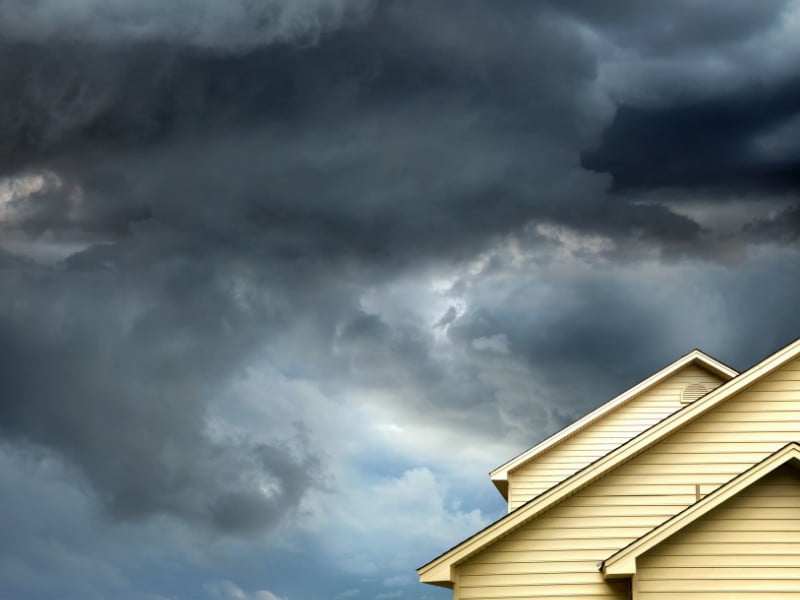The world of real estate, while teeming with opportunities, is also riddled with its complexities. At the forefront of these intricacies is a phenomenon referred to as the ‘housing bubble’, a term you might have encountered in headlines or economic discussions, especially if you recall the 2007-2008 global financial crisis. Understanding this concept, and the lexicon that surrounds it, is paramount for anyone considering diving into the homebuying process. But what exactly is a housing bubble? And why is it essential for potential homebuyers to be acquainted with its accompanying jargon?

What is a Housing Bubble?
Imagine for a moment, a balloon being filled with air. The balloon expands, stretching its limits, growing larger and more unstable, until, suddenly, it cannot hold any more air and bursts. A housing bubble functions in a similar way, but instead of air, it’s filled with rapid and unsustainable increases in housing prices, fueled by speculation, high demand, and other economic factors. Like the overinflated balloon, this rapid increase in prices is unsustainable, and when the market can no longer support these inflated prices, it “bursts”, leading to a sharp drop in home values.
The bursting of a housing bubble can have a ripple effect on the larger economy. Falling housing prices can lead to widespread mortgage defaults, which in turn can impact banks and other financial institutions, potentially triggering a larger economic downturn, as was seen in the 2007-2008 global financial crisis.

Why Understanding Key Terms is Crucial for Homebuyers
For potential homebuyers, stepping into the real estate market without understanding its underlying dynamics is akin to navigating a ship without a compass. The real estate market, like any other, operates on its set of principles, guided by supply and demand dynamics. When these dynamics are skewed, bubbles can form, putting uninformed homebuyers at risk.
Knowledge of these terms and concepts equips buyers with a sort of protective armor. When you can identify the signs of a housing bubble, you’re better positioned to make strategic decisions, like waiting to buy or being more cautious in your home selection. Furthermore, understanding the terminology helps in deciphering mortgage documents, negotiating with lenders, and ultimately ensuring that the investment you’re making is sound and not driven by market euphoria.
Moreover, even outside of housing bubbles, the process of buying a home is filled with jargon – from understanding mortgage rates to navigating the complexities of home equity. By familiarizing oneself with these terms, a potential buyer ensures they are not only protecting their investment but also empowering themselves to make informed decisions that align with their financial and personal goals.
As we delve deeper into the world of housing bubbles and the intricacies of the real estate market, it’s essential to arm ourselves with knowledge. Understanding the terms and concepts that define and shape the market can be the difference between making a wise investment or falling prey to market pitfalls. As the age-old saying goes, knowledge is power, and in the realm of real estate, it’s your most valuable asset.

Understanding Housing Bubbles
The real estate market, a significant segment of any country’s economy, is subject to cyclical movements and can sometimes experience unusual and risky phenomena. One of the most critical and potentially harmful of these phenomena is the housing bubble. To navigate and make informed decisions in such a market, one needs to understand the nuances of a housing bubble, its causes, and the repercussions of its burst.

Definition of a Housing Bubble
A housing bubble, at its core, is a period of rapid and significant price increases in real estate properties, leading these prices to exceed their intrinsic or fundamental values. But what does this mean?
- Overinflated home prices compared to intrinsic values: Think of intrinsic value as the ‘real’ value of the house—what it’s worth based on factors like its physical condition, the land it’s on, and the current state of the local economy. When a housing bubble occurs, prices soar beyond these fundamental aspects, driven more by emotional buying, speculation, and a fear of missing out rather than the actual value of the property.
- Unsustainable growth driven by excessive demand and speculation: A bubble is characterized by its unsustainable nature. Just like a soap bubble that grows quickly and eventually pops, housing prices, during a bubble, shoot up at a pace that is not supported by underlying economic factors. Speculators, who buy properties with the hope of selling them quickly for a profit, play a big role in this. As they buy more and more properties expecting prices to keep going up, they drive demand even higher, further inflating the bubble.

Causes of a Housing Bubble
Several factors can converge to create a housing bubble:
- Low interest rates: Central banks sometimes lower interest rates to stimulate the economy. While this has its advantages, it also means borrowing money becomes cheaper. As a result, more people can afford to take out mortgages, driving up the demand for homes and, consequently, home prices.
- Speculation and “flipping”: As mentioned earlier, speculators play a vital role in inflating a housing bubble. When there’s widespread belief that house prices will continue to rise, more people buy homes purely as an investment, intending to sell—or “flip”—them for a profit in a short period.
- Relaxed lending standards: Sometimes, in an overheated market, lenders become more willing to give out loans, even to those who might not have the financial stability to repay them. This can be due to overconfidence in the market or pressures to keep up with the high demand for mortgages.
- Overconfidence in the market: A general belief that the housing market can only go up can lead people to make irrational decisions, thinking there’s no risk involved. This overconfidence, fueled by media hype and sometimes even government policies, can drive prices skyward.
Effects of a Housing Bubble Burst
The burst of a housing bubble is rarely a quiet event—it has wide-ranging repercussions:
- Plummeting home values: When reality sets in, and people realize that the high property prices aren’t supported by fundamentals, prices can drop dramatically. Homeowners can find themselves in situations where their home is worth less than what they owe on it.
- Increase in foreclosures: As property values drop, many homeowners, especially those who got their homes with small down payments or those with unstable mortgages, may struggle to keep up with their payments. This can lead to an increase in foreclosures, as banks try to recoup their money.
- Economic downturns: The housing market is deeply interconnected with other sectors of the economy. A burst housing bubble can lead to job losses in construction, finance, and other related industries. As people lose their homes and jobs, consumer spending can decrease, potentially leading to a recession.
While housing bubbles might initially seem like times of prosperity and easy money, they’re fraught with risks. Understanding the intricacies of such bubbles can help individuals and policymakers make more informed decisions and potentially mitigate some of the negative consequences.
source: TED-Ed on YouTube
Key Terms Every Homebuyer Should Know

The real estate market, complex as it is, comes with its own language. For both novice and experienced homebuyers, comprehending these terms is paramount to navigating the housing landscape successfully. Each term carries implications that can impact a buyer’s financial health and overall investment strategy. Let’s delve into these key terms, breaking them down to their essentials.
Equity:
- Definition: Equity refers to the difference between the current market value of a property and the amount the owner still owes on the mortgage. It represents the portion of the property that the homeowner truly “owns.”
- Importance in the home-buying process: Equity can be leveraged in several ways. As equity builds, homeowners can tap into it for loans or refinancing opportunities. Furthermore, having significant equity provides a cushion if the housing market declines, reducing the risk of owing more than the house is worth.
Mortgage-Backed Securities (MBS):
- How they work: MBS are financial instruments created by bundling together a group of mortgages. These bundles are then sold to investors, who receive periodic payments derived from the mortgage payments of the original borrowers.
- Role in the 2008 financial crisis: The crisis was in part due to the widespread distribution of “subprime” MBS—those backed by mortgages given to high-risk borrowers. When many of those borrowers defaulted on their loans, the value of the MBS plummeted, causing huge losses for financial institutions worldwide.
Loan-to-Value (LTV) Ratio:
- Definition: LTV is a metric used by lenders to assess the risk of a mortgage. It’s calculated by dividing the mortgage amount by the appraised value of the property.
- Implications for borrowers: A higher LTV often signifies a higher risk for lenders, which might result in higher interest rates. Typically, if LTV is above 80%, borrowers might be required to purchase private mortgage insurance.
Adjustable-Rate Mortgage (ARM):
- Definition: Unlike fixed-rate mortgages where the interest rate remains constant, ARMs have interest rates that adjust at specific intervals based on prevailing market conditions.
- Risks and benefits: The initial interest rates for ARMs are often lower than fixed-rate mortgages, potentially offering savings. However, they come with the risk of the rate (and consequently, the monthly payment) increasing in the future.
Underwater Mortgage:
- Definition: A mortgage is termed “underwater” when the outstanding balance of the mortgage exceeds the current market value of the property.
- Potential outcomes for homeowners: Being underwater can limit a homeowner’s options, making it challenging to refinance or sell the home. It can also lead to foreclosure if the homeowner can’t keep up with payments.
Foreclosure:
- Process: Foreclosure is a legal process where a lender takes control of a property after the homeowner fails to make mortgage payments.
- Implications and alternatives: Foreclosure can severely damage a homeowner’s credit score. Before reaching this stage, homeowners might consider alternatives like loan modifications, short sales, or deeds in lieu of foreclosure.
House Flipping:
- Definition: This refers to the act of buying properties and then selling them after a short period, often after making renovations, aiming for a profit.
- Implications: While flipping can be profitable in a rising market, it comes with significant risks, including unexpected renovation costs and potential declines in property value.
Speculation:
- Definition: Speculation in real estate involves buying properties in the hope that their value will increase, rather than based on their rental income potential.
- Risks: Speculation can drive up property prices, contributing to housing bubbles. If the market drops, speculators can face significant losses.

Affordability Index:
- Definition: This metric measures the average income of a region against the average home prices, gauging how affordable homes are for the average person.
- Implications: A lower affordability index indicates that homes are less affordable, which can signal an overheated market or issues with wage growth not keeping pace with housing costs.
These terms and concepts provide potential homebuyers with the tools they need to understand the broader market landscape and make informed decisions. As with any investment, knowledge and thorough research are crucial to mitigating risks and optimizing returns.
source: Citytv on YouTube

Signs of a Housing Bubble
The allure of the real estate market often draws people in with its promise of stable investment and potential for appreciable gains. However, markets are cyclical, and during times of inflated optimism and unchecked speculation, housing bubbles can form. Recognizing the early signs of such bubbles can provide invaluable insights to both investors and potential homebuyers, enabling them to make informed decisions and perhaps avoid potential financial pitfalls. Let’s discuss the tell-tale signs of a housing bubble.

Rapid Increase in Property Prices:
- Description: One of the most evident signs of a housing bubble is when property prices rise at an alarming rate, outpacing historic norms and the broader economic metrics.
- Faster than wage growth or inflation: For a housing market to be sustainable, house prices should ideally grow in line with wages, ensuring that a majority of people can afford homes. When house prices surge faster than wage growth or general inflation, it’s a red flag. It means people are buying homes based on speculation of further price appreciation rather than fundamental economic reasons.
Increase in House Flipping Activities:
- Description: House flipping, as previously defined, refers to buying properties with the aim of selling them quickly for a profit, often after making minimal renovations.
- Indication of speculative behavior: A significant uptick in flipping activities can be indicative of speculative behavior. When individuals believe that they can buy a property and sell it in a short period for substantial profits, it signifies that irrational exuberance might be driving the market. This behavior can further inflate property prices, pushing them away from their intrinsic value.

High Ratio of House Price to Rent or Income:
- Description: The house price-to-rent ratio and house price-to-income ratio are valuable tools that gauge the sustainability of current property prices.
- Measures of market overvaluation: When property prices rise much faster than rents or incomes, these ratios increase. A high price-to-rent ratio suggests that it’s much more expensive to buy a home than to rent one, possibly pointing to an overvalued housing market. Similarly, a high price-to-income ratio means houses are becoming less affordable for the average person, a situation that isn’t sustainable in the long run.
Unusually High Homeownership Rates:
- Description: Homeownership rates measure the proportion of households that own their homes as opposed to renting.
- Reflecting possibly lax lending standards: When homeownership rates surge quickly, it may be a sign that banks and other lenders are offering loans too freely, perhaps to individuals who might not be in the best position to handle them. This can be due to over-optimism in the housing market or external pressures to keep up with the demand. High homeownership rates driven by lax lending can lead to an increase in defaults later on, pushing the market towards a bubble burst.

Decline in House Sales:
- Description: Even in an environment with rapidly rising house prices, a sudden decline in the number of houses being sold can be a warning sign.
- A potential precursor to price drops: If prices have risen so much that they’re now out of reach for many potential buyers, or if speculation has led to an over-supply of houses on the market, a decline in sales might ensue. This slowdown can be the market’s way of signaling that it’s reached its peak and that a correction or even a sharp decline in prices may be on the horizon.
Understanding and recognizing these signs can be instrumental in deciphering the current state of the housing market. While no single indicator can predict with certainty when a bubble will burst, a combination of these signs can provide valuable insights. For potential homebuyers and investors, such knowledge offers a strategic advantage, ensuring they navigate the real estate market with eyes wide open.

How to Protect Yourself as a Homebuyer
For many, buying a home is the most significant financial commitment they will make in their lifetime. The allure of homeownership, especially in a booming market, can sometimes cloud judgment, leading to decisions that are financially unsound. The memory of the 2008 financial crisis, where many found themselves caught in the grips of a bursting housing bubble, remains a sobering reminder of the importance of caution. Here’s how potential homebuyers can shield themselves against the detrimental effects of a housing bubble and ensure their financial well-being.
Do Your Homework:
- Research local market conditions: Before taking the plunge, familiarize yourself with the dynamics of the local real estate market. Analyze the trends in property prices, rental rates, and home sales over the last few years. Understand the factors influencing the market, be it employment opportunities, new infrastructural developments, or significant demographic shifts.
- Avoid “hot” markets driven by speculation: Markets that have experienced a recent rapid surge in property prices and sales can be risky. This is especially true if the surge is driven primarily by speculative buying. Steer clear of such overheated markets unless you have compelling reasons to believe the growth is sustainable.

Diversify Investments:
- Don’t put all your eggs in the real estate basket: As with any investment strategy, diversification is key. If a significant portion of your wealth is tied to real estate, a downturn in the housing market can severely impact your financial health. Diversify your investment portfolio by exploring other avenues like stocks, bonds, or mutual funds. By spreading risks, you ensure that a potential dip in one asset class doesn’t sink your entire financial ship.
Avoid ARMs if Rates are Historically Low:
- Potential for interest rate spikes: Adjustable-Rate Mortgages (ARMs) may seem appealing with their initial low-interest rates. However, if you’re buying when interest rates are historically low, there’s a higher chance that rates will climb in the future. With ARMs, this could translate to a significant hike in monthly payments, straining your finances. Opting for a fixed-rate mortgage provides stability, ensuring that your interest rate remains unchanged regardless of market fluctuations.’

Maintain a Healthy Down Payment:
- Reduces the risk of going underwater: The allure of low down payment deals can be tempting, but the higher your equity in the property from the outset, the better. A substantial down payment not only results in lower monthly mortgage payments but also acts as a buffer should property values decline. This reduces the risk of finding yourself in an underwater mortgage situation where you owe more than the property’s worth.
Buy Within Your Means:
- Ensure affordability even if the market turns: While it’s tempting to stretch finances in the hopes of securing a dream home, it’s crucial to buy a property you can comfortably afford. This includes accounting for potential changes, like job loss or unexpected expenses. Remember, even if the market is on an upward trajectory now, conditions can change. If they do, you don’t want to find yourself overextended and struggling to make payments.
Buying a home is as much an emotional decision as it is a financial one. However, it’s essential to approach it with a rational mindset, equipped with thorough research and a keen understanding of both the market and your financial capabilities. By adopting a prudent approach and protecting yourself against the vagaries of the housing market, you not only safeguard your investment but also ensure peace of mind as you embark on the journey of homeownership.

Conclusion
The journey of homeownership is a significant milestone, an embodiment of aspirations, dreams, and in many cultures, a rite of passage into adulthood and financial maturity. For many, it represents a sanctuary of warmth, memories, and security. However, beneath this sentimental veneer, there lies a complex web of financial and market dynamics that can, if not navigated judiciously, metamorphose this dream into a nightmare.

Understanding Housing Bubbles for Homebuyers
Understanding housing bubbles isn’t just a matter of economic curiosity; it is an imperative for every potential homebuyer. The history of real estate, marred by the cyclical nature of boom and bust, stands testament to the havoc housing bubbles can wreak. A bubble, seemingly innocuous in its ascent, can result in homeowners watching their life’s savings dissipate, families displaced, and whole economies paralyzed. Hence, a comprehension of the signs and mechanics of these bubbles isn’t just beneficial—it’s crucial.
Throughout this exploration, we’ve ventured deep into the anatomy of housing bubbles, from their genesis to their cataclysmic bursts. We’ve spotlighted the unmistakable signs, the indicators that scream caution. The terminology, often ensconced in economic jargon, was demystified, revealing the stark realities and repercussions of concepts like “underwater mortgages” or the deceptively named “adjustable-rate mortgages.”
Informed Decision-Making in any Housing Market Condition
As we stand at this juncture, the core message reverberates with clarity: the need for informed decision-making. The real estate market, with its allure and promise of lucrative returns, can sometimes sway judgments, leading individuals down a path of over-leverage and over-optimism. But equipped with knowledge, a potential homebuyer can tread with confidence, recognizing traps, discerning value from overvaluation, and essentially, making decisions that stand the test of time and market volatility.
In any market, be it soaring or stagnating, the key to successful homeownership lies in the marriage of passion with prudence. Embrace the dream of owning a home, but let it be tempered with research, foresight, and a touch of skepticism. Let the lessons of the past serve as both cautionary tales and guiding beacons. After all, a home is more than just bricks and mortar; it’s a legacy, a testament to one’s life choices. So, as you stand on the cusp of this significant decision, take a moment, reflect, educate yourself, and ensure that your choices today echo positively in the annals of your future.
Important Information
Comprehensive Investment Disclaimer:
All content provided on this website (including but not limited to portfolio ideas, fund analyses, investment strategies, commentary on market conditions, and discussions regarding leverage) is strictly for educational, informational, and illustrative purposes only. The information does not constitute financial, investment, tax, accounting, or legal advice. Opinions, strategies, and ideas presented herein represent personal perspectives, are based on independent research and publicly available information, and do not necessarily reflect the views or official positions of any third-party organizations, institutions, or affiliates.
Investing in financial markets inherently carries substantial risks, including but not limited to market volatility, economic uncertainties, geopolitical developments, and liquidity risks. You must be fully aware that there is always the potential for partial or total loss of your principal investment. Additionally, the use of leverage or leveraged financial products significantly increases risk exposure by amplifying both potential gains and potential losses, and thus is not appropriate or advisable for all investors. Using leverage may result in losing more than your initial invested capital, incurring margin calls, experiencing substantial interest costs, or suffering severe financial distress.
Past performance indicators, including historical data, backtesting results, and hypothetical scenarios, should never be viewed as guarantees or reliable predictions of future performance. Any examples provided are purely hypothetical and intended only for illustration purposes. Performance benchmarks, such as market indexes mentioned on this site, are theoretical and are not directly investable. While diligent efforts are made to provide accurate and current information, “Picture Perfect Portfolios” does not warrant, represent, or guarantee the accuracy, completeness, or timeliness of any information provided. Errors, inaccuracies, or outdated information may exist.
Users of this website are strongly encouraged to independently verify all information, conduct comprehensive research and due diligence, and engage with qualified financial, investment, tax, or legal professionals before making any investment or financial decisions. The responsibility for making informed investment decisions rests entirely with the individual. “Picture Perfect Portfolios” explicitly disclaims all liability for any direct, indirect, incidental, special, consequential, or other losses or damages incurred, financial or otherwise, arising out of reliance upon, or use of, any content or information presented on this website.
By accessing, reading, and utilizing the content on this website, you expressly acknowledge, understand, accept, and agree to abide by these terms and conditions. Please consult the full and detailed disclaimer available elsewhere on this website for further clarification and additional important disclosures. Read the complete disclaimer here.







